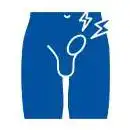

Hernia is a medical condition in which the organ that resides inside the body pushes through the surrounding muscle wall and protrudes outwards. It looks like a lump on the skin. This happens when the muscles surrounding the protruding organ are weakened and form a gap/hole. Depending upon its location on the body, there are various types of hernia, one of them being Inguinal hernia. The inguinal hernia occurs when a part of an intestine protrudes through the surrounding abdominal muscles from the weak spot. You may or may not feel the pain in the bulge area. The pain is usually felt when you bend over, cough, or lift heavy objects. The inguinal hernias happen when a part of the abdominal membrane that surrounds the omentum (abdominal cavity) or an intestine, protrudes from a weak spot in the abdomen along with the inguinal canal that carries the spermatic cord (in men). Generally, the inguinal hernia is not dangerous. However, it cannot be cured on its own and can lead to other complications in the body. Hence, inguinal hernia repair is a commonly performed surgical procedure to fix the hernia.
In Africa, there is a high need for inguinal herniation, but the number of surgeries successfully performed remains low. Studies show that the incidence rate of inguinal hernia in Africa is about 60 to 175 cases per every 100,000 populations out of which, only 25 patients receive the surgical treatment due to inadequate medical care funding.
Because of this reason, many people from African countries like Rwanda, Uganda, Zambia, and Tanzania decide to travel to another country for proper medical treatments. Amongst the many different country options, they choose India because of the vast variety of treatment options available and the plus point is amazingly lower cost. Hospitals in India have the most advanced infrastructure and modern facilities. Indian surgeons are trained very well and they have a lot of experience in providing the right treatment. It is not always possible to find the best treatment at a low cost which is provided to them by Indian hospitals for inguinal hernia treatment. Hence, they decide to get their inguinal hernia surgery in India.
There are generally two inguinal hernia types: direct and indirect inguinal hernia. Based on the condition of inguinal hernia, they can be incarcerated inguinal hernia and strangulated inguinal hernia.

This type of inguinal hernia is caused by weakening of the abdominal muscles and it is mostly seen in adults. It happens when the organs from the abdomen bulge through the weak spot. It mostly occurs in men whereas children and women rarely have this condition.
This type of inguinal hernia happens due to the defect present in the lower abdomen at birth. The fetus has openings for the inguinal canal in the abdomen which closes before the birth. In some cases, the opening does not close and forms a weak spot. This can form a hernia. It may not develop initially and can occur later in life.
When the hernia occurs and gets stuck at the groin region, and if it cannot be pushed back, it is known as incarcerated inguinal hernia.
This is a very complicated inguinal hernia type where the blood flow towards the incarcerated intestinal hernia is cut off.
The inguinal hernia causes include the abdominal muscles and wall surrounding the internal organs weaken and form a gap. This allows the internal organs to protrude outwards. This can be caused due to many reasons which are listed below:
Each patient has different inguinal hernia symptoms depending upon the condition of the hernia. Your doctor can diagnose the symptoms you are experiencing and can tell if it is related to hernia or not. The following are some of the possible symptoms of an inguinal hernia:

Your symptoms may become more severe when you exert yourself physically by bending over, lifting heavy objects, coughing, or standing for an extended period. They may improve when you sit down or lie down.
Males are more likely to catch the inguinal hernia disease than females. However, this condition may affect either side of the body. A hernia in the inguinal region may develop at any time. Babies are sometimes born with ones that don't manifest till later in life. About 5% of newborns are affected by this disorder.
It is possible to get an inguinal hernia if you put constant pressure on your abdominal wall, like when you strain to use the restroom, cough for an extended period, are overweight, or lift significant weights. In addition, you may be more likely to get an inguinal hernia if there's a history of it in your family. Premature babies also face a greater risk of this condition.
You will need a proper physical exam to diagnose an inguinal hernia. Your doctor will ask about your symptoms and examine the area of inguinal herniation. He/she may ask you to stand, strain, and cough to make the bulge more visible. If the diagnosis is not evident, then your doctor may run some imaging testing such as a CT scan, MRI, or abdominal ultrasound.
When a hernia is minor and in an accessible location, laparoscopy may be a helpful diagnostic and therapeutic tool. In addition, this inguinal hernia treatment technique has shortened recovery time, and scarring is minimized compared to conventional surgery. Your surgeon will give first preference to performing a laparoscopic inguinal hernia surgery in India as it is a minimally invasive approach and helps in faster recovery.
In the laparoscopic approach of hernia repair surgery, you will be first given anesthesia to achieve a pain-free surgery. Your surgeon will then sanitize the area and make a few cuts near the herniated area. Then he/she will insert a medical device called a laparoscope which has a camera and light attached to the initial part, it will provide a real-time video of the internal organs on a TV monitor. Through the other cuts, the surgical instruments are inserted to perform the surgery. Then, your surgeon will push the herniated organ back into its place, and place a mesh that will provide strength by acting as a reinforcement and prevent the reoccurrence of inguinal herniation. After the surgery is done, the medical devices are removed and the cuts are closed with the stitches.
In most cases, the laparoscopic approach is a preferred choice for an inguinal hernia repair procedure. However, when the laparoscopic approach (which requires a few small cuts) is not suitable for you, your surgeon suggests an open surgery which involves making only one large incision to reach the herniated organ. The reasons include: if you have other medical complications, if the severity of your hernia is high, and if the hernia is causing other problems in your body.
The open surgery for a hernia includes first making you unconscious by administering general anesthesia so that you will be asleep during the surgery. This is done to avoid pain during the procedure. Then your surgeon will sanitize the area, and make only one large incision. Then the herniated organ will be pushed back into its place, and the weakened area will be sewed. A mesh will be placed to provide strength (reinforcement) to prevent the hernia from reoccurring. Once the procedure is completed, the incision/cut is then closed by sewing them with the stitches.
Besides the laparoscopic and open surgery for hernia repair, there is a new technological approach in India to perform the surgery known as Robotic Hernia Repair Surgery. The only difference between traditional surgery and robotic hernia repair surgery is that in robotic-assisted surgery, your surgeon will handle the robotic arms and perform the surgery through a console.

Inguinal hernia can be a painful condition that requires surgery for treatment. CureIndia can connect you with the leading hernia surgeons for your inguinal hernia surgery in India. General surgeons in India are highly experienced and qualified to perform inguinal hernia surgery. Let's hear from some of the most experienced inguinal hernia specialists in India:

Dr. Anshuman Kaushal is a advanced laparoscopic GI, Bariatric & Laser surgeon in India. He is known as the top general surgeon in Delhi NCR. In his career, till now he has done over 15,000 surgeries globally. He has proficiency in gastric bypass surgery on a pill and is renowned as a gastric bypass surgeon in Gurgaon.



Depending upon the type of surgery, the severity of your inguinal hernia, your age, whether you have other medical problems, the choice of your hospital, the city your hospital is in, the cost of travel and stay, the cost of medicines, the fees of your surgeon, etc., the total cost of inguinal hernia treatment varies. However, the average cost of inguinal hernia surgery in India is about $959.24 to $1,498.81. The cost of the same procedure in the USA ranges from around $4,000 to $11,000, and in the UK it ranges from $4,304.36 to $5,604.50. It is very clear that inguinal hernia surgery in India is much more affordable compared to other countries.
| Treatment | Cost in India | Stay in India |
|---|---|---|
| Inguinal Hernia Surgery in India | $3,000 | 7 Days |
After the surgery is completed, you will be taken to the recovery room where your blood pressure, breathing, and heart rate will be monitored. When the effect of anesthesia wears off you will be awake. You will notice that you will have an IV in your arm. This will be for giving you medicines and fluids. You will have bandages over the incision site. As you become fully conscious, you can start consuming food and fluids. Before you leave the hospital, your surgeon will give you instructions to follow such as you must have someone to take care of you for a few days, instructions on how to take care of the incision site, when to start your regular activities, what food you should avoid and any other dietary changes that you should include, etc. With proper rest and following your surgeon’s instructions, you will be completely recovered within two weeks.
Inguinal hernia occurs near the groin area. It is more common in men than in children and women. The inguinal hernia disease cannot be cured on its own and surgery is needed to fix it. There are two traditional approaches for inguinal hernia repair available in India. In addition to the traditional surgeries, the modern technology is also available in Indian hospitals. Indian hernial surgeons have studied in international institutes and have undergone rigorous training. The cost of inguinal hernia surgery in India is much lower than the other countries. With the lower cost, the treatment quality is not compromised. If you are planning a medical trip to any country, you should definitely consider India.
